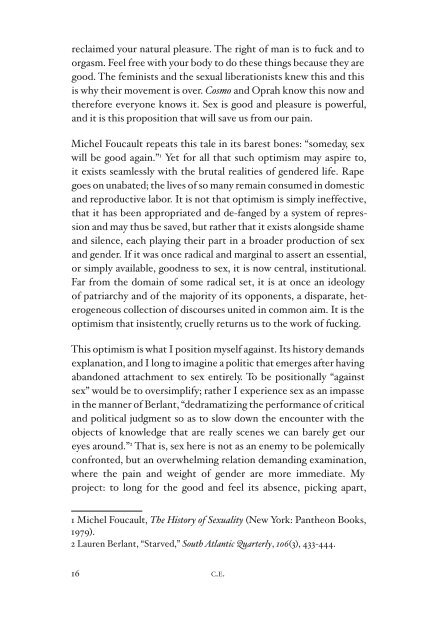Lies: A Journal of Materialist Feminism - Libcom
Lies: A Journal of Materialist Feminism - Libcom
Lies: A Journal of Materialist Feminism - Libcom
You also want an ePaper? Increase the reach of your titles
YUMPU automatically turns print PDFs into web optimized ePapers that Google loves.
eclaimed your natural pleasure. The right <strong>of</strong> man is to fuck and to<br />
orgasm. Feel free with your body to do these things because they are<br />
good. The feminists and the sexual liberationists knew this and this<br />
is why their movement is over. Cosmo and Oprah know this now and<br />
therefore everyone knows it. Sex is good and pleasure is powerful,<br />
and it is this proposition that will save us from our pain.<br />
Michel Foucault repeats this tale in its barest bones: “someday, sex<br />
will be good again.” 1 Yet for all that such optimism may aspire to,<br />
it exists seamlessly with the brutal realities <strong>of</strong> gendered life. Rape<br />
goes on unabated; the lives <strong>of</strong> so many remain consumed in domestic<br />
and reproductive labor. It is not that optimism is simply ineffective,<br />
that it has been appropriated and de-fanged by a system <strong>of</strong> repression<br />
and may thus be saved, but rather that it exists alongside shame<br />
and silence, each playing their part in a broader production <strong>of</strong> sex<br />
and gender. If it was once radical and marginal to assert an essential,<br />
or simply available, goodness to sex, it is now central, institutional.<br />
Far from the domain <strong>of</strong> some radical set, it is at once an ideology<br />
<strong>of</strong> patriarchy and <strong>of</strong> the majority <strong>of</strong> its opponents, a disparate, heterogeneous<br />
collection <strong>of</strong> discourses united in common aim. It is the<br />
optimism that insistently, cruelly returns us to the work <strong>of</strong> fucking.<br />
This optimism is what I position myself against. Its history demands<br />
explanation, and I long to imagine a politic that emerges after having<br />
abandoned attachment to sex entirely. To be positionally “against<br />
sex” would be to oversimplify; rather I experience sex as an impasse<br />
in the manner <strong>of</strong> Berlant, “dedramatizing the performance <strong>of</strong> critical<br />
and political judgment so as to slow down the encounter with the<br />
objects <strong>of</strong> knowledge that are really scenes we can barely get our<br />
eyes around.” 2 That is, sex here is not as an enemy to be polemically<br />
confronted, but an overwhelming relation demanding examination,<br />
where the pain and weight <strong>of</strong> gender are more immediate. My<br />
project: to long for the good and feel its absence, picking apart,<br />
1 Michel Foucault, The History <strong>of</strong> Sexuality (New York: Pantheon Books,<br />
1979).<br />
2 Lauren Berlant, “Starved,” South Atlantic Quarterly, 106(3), 433-444.<br />
16<br />
C.E.

















